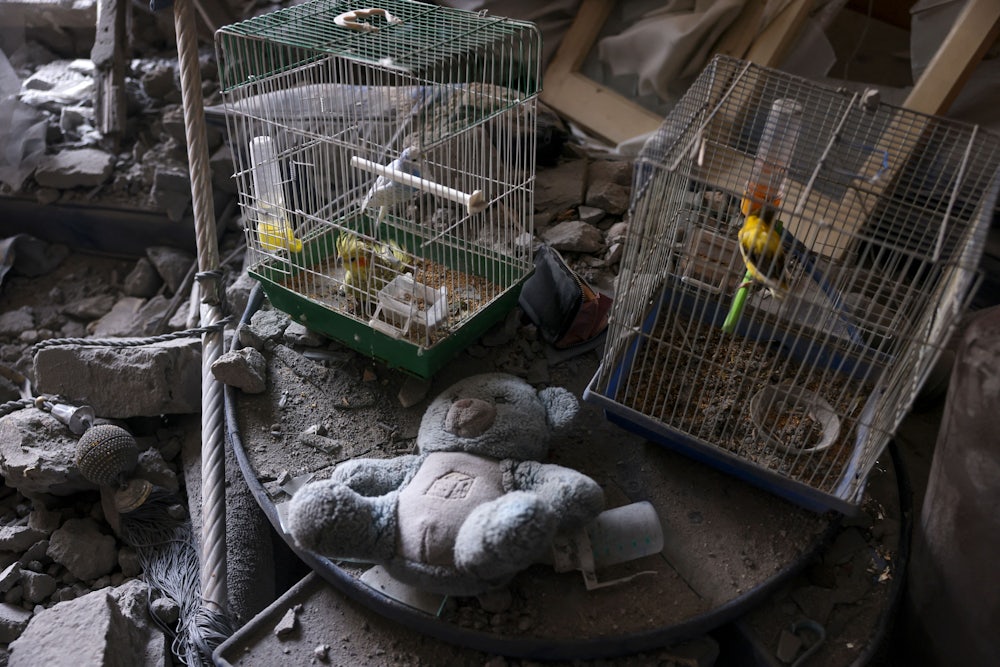It started with the dead birds. Last week, more than a thousand migratory birds were killed in one night by flying into one building in Chicago. Among the tiny corpses were 33 types of birds, and most of them were songbirds too, the kind that, if you’re a birdwatcher, like me, you get excited about seeing, like palm and yellow-rumped warblers.
The images of so many small dead birds were devastating. Experts blamed the unusual weather, windy and cloudy conditions that caused many to fly at a lower altitude than usual and to be more confused by illuminated glass buildings. (Though climate change has contributed to migratory disruptions of this kind, the deaths can easily and affordably be reduced by altering the glass and turning off the lights at night.)
If this sort of thing haunts your sleep, you’re not alone. Needless cruelty like the bird collisions in Chicago has effects that go beyond the ecological. A study published last month titled “This Image Haunts Me to This Day” demonstrated the psychological distress that photos of animal death and species extinction cause for conservation professionals. We have been bombarded by images of animal deaths this year, with whales washing up on East Coast beaches this summer and reports that earlier this month more than one hundred dolphins died in the Brazilian Amazon, probably because of warming water and drought. This week, the U.S. Fish and Wildlife Service delisted 21 species from the Endangered Species Act—because they’d gone extinct.
After the sickening mass death of birds in Chicago, the news got much worse, the violent imagery incalculably more horrific. On Saturday, Hamas killed more than a thousand Israelis. In the days since, the Israeli military has killed many more Palestinians than that, in Gaza, while exacerbating the humanitarian crisis by cutting off water and electricity to the enclave.
Even as we feel grateful—perhaps even guilty—for our own safety, these events are crushing to witness, even from afar. What does it do to us to witness so much devastation?
Of course, I am not comparing human deaths to bird deaths. Nor am I equating the trauma of witnessing death in the news to that of having our families killed and our homes destroyed, as Israelis did last Saturday and Palestinians are now, at an even more devastating scale. But watching our world’s twin crises of ecological collapse and escalating warfare is taking a toll, even on those of us least directly affected.
The mental health effects of war, even for people far from the conflict, are well documented. After the bombings at the World Trade Center in New York City on September 11, 2001, research showed traumatic effects not only on those who witnessed the terrorist attacks but on people who saw them live on television. In fact, faraway TV consumers of the event were even more likely to develop trauma symptoms than those who lived in New York City at the time (as I did).
These effects have been greatly worsened by cell phones and social media. We did not carry our televisions with us everywhere in 2001; we now consume the imagery of war, terrorism, and violence far more avidly. For many of us, staying informed is an obligation, a matter of conscience, of good citizenship. Yet the World Health Organization—and many other experts—say that consuming war imagery can intensify our distress. The National Alliance on Mental Health is recommending that we limit our exposure to images of the war in Israel and Gaza because of their impact on our mental health.
We don’t want to see all the dead children—but we also can’t look away.
We should be agonized by the bird deaths, and of course even more so by the massacre of humans in Israel and in Gaza. Our distress should move us to action. The love that humans have for certain animal species—like birds, whales and dolphins—and sadness at their deaths has often motivated conservation efforts. And it should: We must agitate to fix our buildings so that they do not kill birds, as one notorious New York City condo high-rise has done recently. We should, more complicatedly and even more urgently, demand that our own government stop fueling murder in the Middle East and play a constructive role in brokering a ceasefire.
Some people are doing just that. Jewish groups opposed to Israel’s military occupation of Gaza are in Washington, D.C., right now demanding that the U.S. government stop funding hostilities. Media professionals and human rights activists are trying hard to let the world know what is happening. We need information too; in its absence springs misinformation, which one would think could hardly be worse than the reality (yet in the case of the alleged beheading of Israeli babies last weekend, which no news organization could verify, sometimes it is).
It’s not callous to give yourself a mental health break so that you can get through the day, though it would be unconscionable to ignore all this bad news and all the awful photos of carnage. But let’s make sure that if we’re going to suffer through it, if we’re going to bear witness to all this death and destruction, we do more than just traumatize ourselves by doom-scrolling. We must demand that it end.






